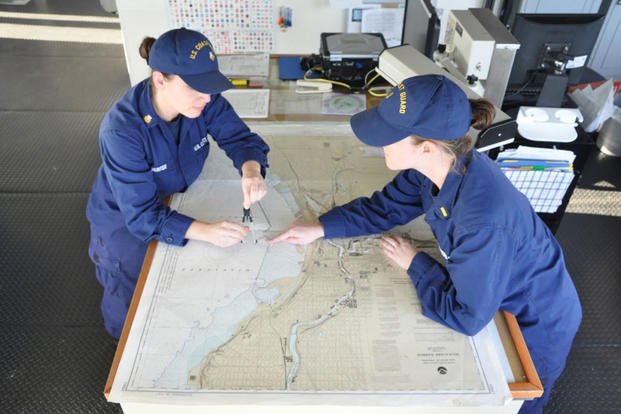As part of an ongoing effort to attract and retain women in the Coast Guard, the service has eliminated gender-specific pronouns from members' promotion packages and professional evaluations.
Under the new guidelines, "reported-on officer" has replaced "he" or "she," and no reviewing officer can use terms like "his" or "her." First names are not given, and the use of "flowery, fluffy language that might 'read differently' for women than men" is strongly discouraged, according to Lt. Cmdr. Kristin Jaekel, assistant gender policy adviser with the Coast Guard's Office of Diversity and Inclusion.
The new guidance is designed to mitigate bias in the evaluation system that could influence promotions or job placement, explained Cmdr. Andrea Smith, deputy of the service's Personnel Readiness Task Force, addressing members of the Defense Advisory Committee on Women in the Service, or DACOWITS, during a meeting Tuesday in Alexandria, Virginia.
The Coast Guard in March released results of a commissioned study on women in the service that found they stayed in the service at significantly lower rates than their male counterparts.
Related: Coast Guard Eyes Changes to Physical Standards, Tattoo Policy to Retain Troops
Reasons cited for leaving ranged from assignments to collateral duties considered stereotypical female activities, such as morale and administrative tasks, that don't enhance career development, and a belief that men and women are treated differently in the service.
For example, the study noted, women are often excluded from group activities and see limited opportunities for advancement.
The results of the study, conducted by Rand Corp., were gleaned from input from 1,010 women and 127 men in more than 160 focus groups.
Women comprise roughly 15% of the Coast Guard. To encourage women and men to join the service and make it "the employer of choice" for all, Coast Guard Commandant Adm. Karl Schultz earlier this year announced a number of personnel policy changes and planned initiatives designed to retain members.
The pronoun change is one of the "early action items" immediately implemented, Smith said.
The Coast Guard can make the professional review process gender-neutral because, unlike some other services, it does not use photographs in promotion board packages or evaluations, Jaeker explained.
Without a photo and without a first name, "you don't know," she said.
Language choice is also important, she added. "[A woman's eval] may say 'pleasant personality, cheery, bright, happy every day,' whereas the male eval might say 'led, spearheaded, action-oriented,' very masculine terms. There's that bias, even though they may both be scheduling officers, managing the activities for eight aircraft a week."
Other policies under scrutiny as a result of the retention study are the Coast Guard's physical standards, which are based on body mass and require a tape measurement of all personnel twice a year. Tattoo regulations will also get a review.
Immediately after Schultz received Rand's preliminary findings, he announced a program that would allow reserve members to step into active-duty jobs when a service member takes maternity, convalescent or caregiver leave.
Coast Guard officials said Tuesday that since the new "surge" program's introduction two months ago, 30 Coast Guard men and women have used it.
Other "early action items" include extending the amount of leave new parents can take, the opportunity for new moms to decline temporary assigned duty that requires deployment for up to a year after childbirth, and making co-location easier for service members married to other Coast Guard men and women.
"We are looking across the service to identify other areas of personnel readiness. We recognize that anything positive we are doing for women, we are doing for all our members," Smith told DACOWITS.
-- Patricia Kime can be reached at Patricia.Kime@Military.com. She can be reached at @patriciakime.












